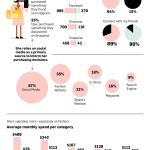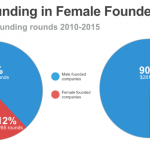This Is Exactly How Hard It Is For Mom Entrepreneurs
The U. S. economy is $2 trillion larger now than it would have been if women hadn’t become a growing part of the workforce since the 1970s. That’s according to a recent report from the U.S. Congress Joint Economic Committee (JEC). The report revealed how closing the gender wage gap could impact our economy even more. At the last Census count, women-owned businesses added $1.6 trillion in revenue. Imagine the impact to the economy then, if more mothers started their own businesses. But it’s not so simple.
The challenges are the focus of a new Kauffman Foundation report titled “Labor after Labor” that breaks down how mothers who are entrepreneurs are being prevented from reaching their full economic potential.
The Kauffman report reveals that since 2000, women’s labor force participation has actually stagnated (men’s has been on a steady decline since the 1950s, according to Pew Research). That’s despite Census data showing women now hold more bachelor’s degrees than men.
We know that we are pretty far behind on gender equality at work because women face greater barriers to advancement.
When a woman becomes a mother, the challenges continue to mount. Michelle Budig, author of “The Fatherhood Bonus and the Motherhood Penalty,” found that working mothers are viewed and more distracted and less productive, while working fathers are viewed as more stable because they have kids to support. Other research from Harvard indicates that women who become mothers are perceived as less goal-oriented than men.
Related: These Are The Best Places In The U.S. For Women-Owned Businesses
So it’s no wonder that starting a business could appear like a better avenue for a working mother. But the Kauffman report says, “Many additional challenges exist for mother entrepreneurs, including increased work-family conflict, cognitive biases, and lack of mentorship and social capital.”
This explains why there are substantially fewer women-owned businesses than those owned by men—and less than there were projected to be decades ago. The National Women’s Business Council found that women-owned firms only account for just 10.6% of all employer firms. The Kauffman report points out that in 1990, the Small Business Administration (SBA) forecasted women-owned businesses would make up 40% of total businesses by 2000.
The Kauffman report cites research that found mother entrepreneurs are additionally faced with cognitive biases and greater family conflict. Ironically, the search for more flexible hours that may have driven the decision to start the business is also not easy to achieve. Not to mention the other hurdles they have to overcome.
Women entrepreneurs are seen as less skilled than their male counterparts, according to research out of Stanford. Women founders also face that bias in their search for funding, hurting their ability to start with adequate capital and resources. Women often start with about half the financing men do, and rely on personal savings and credit cards for seed funding. The Kauffman Index also found that nearly half of women entrepreneurs surveyed don’t have the right mentorship to help grow their ventures.
RELATED: The Racial Gap In Entrepreneurship Is Costing The U.S. Economy Billions
Pile on the additional challenges for mothers, not the least of which is that starting a business strains personal relationships, especially among family members and impacts emotional well-being. The family factor affects mothers more than fathers, research shows.
Then there’s the timing factor: The Kauffman Index shows that a quarter of new entrepreneurs are between the ages of 20 and 34. That’s coincidentally the age of a majority of mothers of newborns. That makes babies and businesses collide.
The report’s authors write:
“While these perceptions of women and mothers are often false, these narratives create real barriers. Women themselves may accept them and be deterred from pursuing entrepreneurship as a viable career path. And those mothers who start new businesses will meet these challenges when they seek financial or social support for their ventures.”
So what can help? The authors are optimistic that millennials’ values will begin to be reflected in the workplace, notably among young fathers who want to be more engaged with their children. Additionally, the rise of two-income couples working full time should bring about greater sharing of unpaid work.
The Kauffman report also recommends changes to public policies for working mothers, increasing paid parental leave, particularly for fathers, restructuring workweeks for more flexible hours, increasing mentorship, and a greater celebration of women’s entrepreneurship. They write: “As our society shifts to embrace more nontraditional work, we look forward to both policy and practice creating the space for mother entrepreneurs to succeed.”
Fast Company , Read Full Story
(9)














